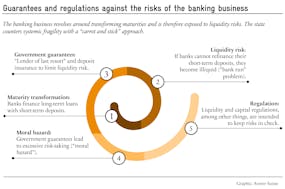Platforms such as trade fairs, online forums, daily newspapers and even credit cards companies bring together very different user groups (e.g., buyer and seller of a product or service). These platforms acts as intermediaries, facilitating the transaction of the market in question. The market process creates added value for all stakeholders by limiting transaction costs. With the help of the internet, such direct access markets have experienced significant growth in recent years. Online trading portals such as AirBnB, eBay or Uber are just a few of the success stories. As a rule, online platforms receive a commission for their services, while the service provider determines the retail prices.
A typical component of the online intermediary business model is a preference clause, which should prevent the traded products from being offered cheaper at other points of sale. In other words, trading platforms are confronted with a classic consumer market problem. Customers have an incentive to search and compare prices on the online trading platform, but look to make the final purchase at a cheaper place directly from the service or product provider. In this way the online platform lose a valuable source of income and will have to redevelop their online services.
Price disparity clauses can be “broad” or “narrow”. Broad clauses will include the guarantee that no other online platform – even the service provider’s – will offer better conditions. A narrow clause, on the other hand, will stipulates that only the service provider is not allowed to offer any better conditions. At an international level, it is the broad clause that is causing much criticism from competition authorities. It is feared that these will not only prevent the spread of market free riders, but will also weaken segment competition by preventing the emergence of new platforms. Whether a price disparity clause is actually harmful in practice must be clarified in each individual case.
In this context, Switzerland’s Competition Commission already opened an investigation into various online booking portals in 2012 and banned the use of broad price clauses. This policy sent a clear signal. On the other hand, narrow price disparity clauses are not entirely prohibited. They are generally considered to be unproblematic and have gained significant acceptance since they do not eliminate the competition between the individual online platforms. They are only designed to prevent the service provider from interfering with the services of the trading platform.
However, and more significantly for future developments, the fact that the Council of States is still calling for a sector-specific bans on price disparity must be described as far-reaching and misguided state interventionism. Although the effects of price disparity clauses in the digital economy remain under-explored, broad regulation could impair growth of the service industry. It is therefore absolutely necessary to prevent sector-specific or broad price regulation. The existing competition law is sufficient to counter any negative effects of price disparity clauses.
This article was first published in the “Handelszeitung” on 16 March 2017.





